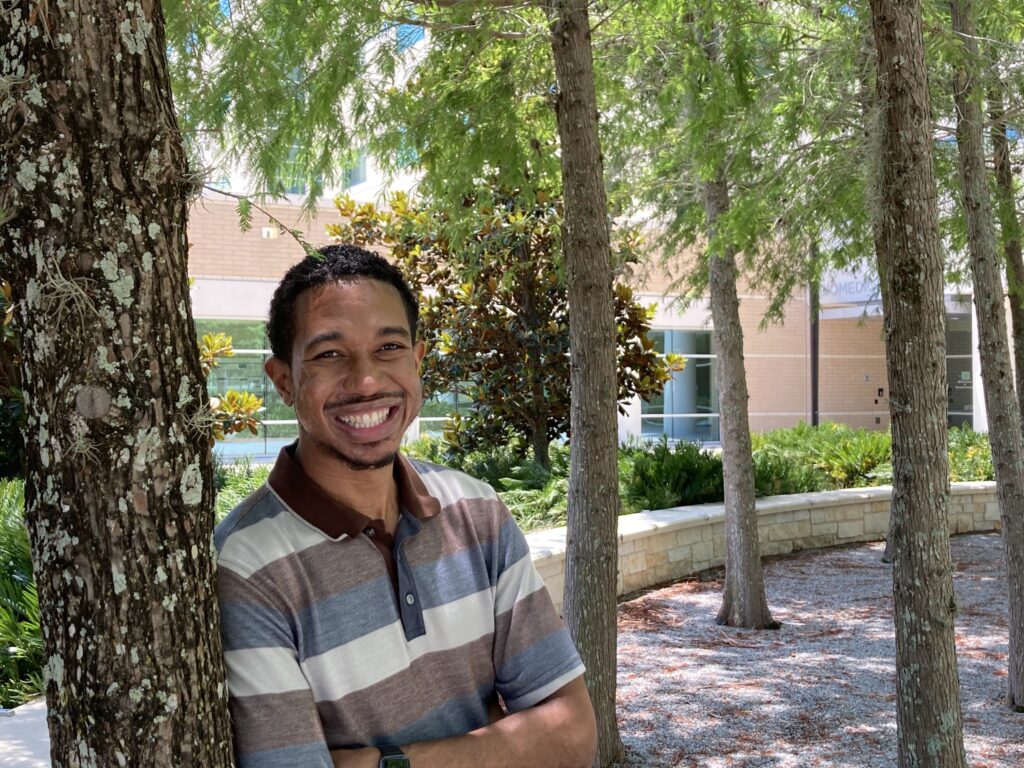
Biomedical and mechanical engineer Robert Steward Jr. is one of five UCF National Science Foundation CAREER grant recipients who are finding innovative and bold new ways to solve challenges that could be game changers in healthcare and engineering.
The award recognizes early career professionals with promising research who have the potential to serve as academic role models and lead their respective fields. This year’s recipients bring the total of UCF awardees to more than 50 in the past 10 years.
Dr. Steward, who is an assistant professor jointly affiliated with both the College of Engineering and the College of Medicine, will receive $500,000 to further his research using cell mechanics to understand how diseases occur in the body.
The body is often referred to as a machine and if that’s the case, Dr. Steward is a mechanic trying to find out what causes the heart and blood vessels to break.
In this analogy, heart disease and diabetes are the breakdowns. Using his background in cell biology and engineering, Dr. Steward looks at the cells that line inside of blood vessels to examine the mechanics at work.
He uses an automated fluorescent microscope coupled with complex mathematical algorithms to see, model and calculate the mechanical forces generated by cells. This high-tech system allows him to determine how strong cells are working. In the case of heart disease, the cells appear to exert more pressure, which then also impacts blood flow. If we can better understand these dynamics, we may be able to develop mechanic-based therapies to help stop or potentially eliminate heart disease, he said. The technique is applicable to other kinds of cells that he hopes his work is a stepping-stone that can be used to add the knowledge necessary to find a cure to heart disease, diabetes and cancer.
Dr. Steward says the CAREER grant will help him fund his lab provide more time to spend mentoring students. For him, helping students find their way especially into research areas that aren’t yet established is part of his core mission.
The Chicago native is the only biomedical/mechanical engineer working with cell mechanics at UCF.
“I found cell mechanics by accident,” he says. “I knew I wanted to work in the medical field, and I knew I liked engineering, but I had no idea I could combine the two.”
He attended Clarke Atlanta University, a Historically Black College and University, which he says played a big role in finding his way to a doctoral degree and more opportunities to better his life. Through the university he was able to get a National Institutes of Health fellowship. Even then, he wasn’t quite sure what to do with it. The fellowship came with funding to cover two years of research anywhere, but it didn’t come with instructions.
“I didn’t know what to do,” he says. “So, I started calling universities and telling them I have funding, am studying mechanical engineering and I wanted to do research in biology, do you have a lab that might be a good fit?”
After several phone calls he ended up at the University of Maryland at College Park working with a professor in the orthopedic biomechanics lab during the summer after his junior year of college. The following year he made another round of cold calls and ended up at Carnegie Mellon University, where he would eventually earn his doctorate. He also met a mentor that helped shape his future. Next stop was Harvard University where he completed post-doctoral work and was able to work alongside medical doctors. It was a life-changing experience.
“Doctors are no-nonsense,” he says. “They would tell me, that’s great, but how is that going to help me help my patient. I really liked that environment.”
That was one big reason he joined UCF in 2015. It was an opportunity to work in engineering and alongside doctors again. Dr. Steward’s lab is at the Lake Nona campus and he splits his time on the main campus where he teaches engineering classes.
The best part about the CAREER grant, he says, is the ability to mentor more students and spend more time in the lab, which will lead to more discoveries and publications.
“I didn’t know graduate school was an option,” he says. “I didn’t know I could turn my love of engineering into this amazing career. I didn’t see a lot of people who looked like me once I started doing research. The difference for me was meeting the right mentors. I want to be that for my students. I know because I’ve lived it. So that’s why this grant means so much to me. It will buy me more time to mentor students.
The other College of Medicine recipient was Dr. Salvador Almagro-Moreno whose research focuses on flesh-eating bacteria and other marine pathogens. Read more about his award and research here.